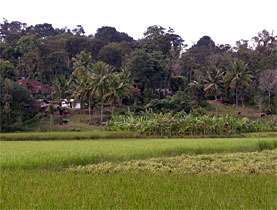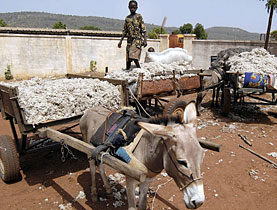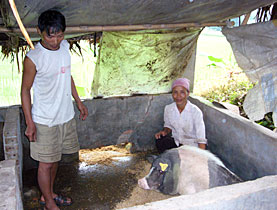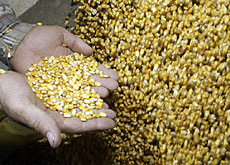Science offers hope to developing countries

A mere 14 months after opening its doors, Zurich's North South Centre has notched up notable successes in helping improve the lives of people in developing countries.
And the scientific research programme at the Federal Institute of Technology plans to widen the scope of its activities by attracting more funding and embarking on further international collaboration.
The North South Centre was created in June 2007 to bring all the Federal Institute’s efforts towards improving living conditions in developing countries under one roof.
The centre’s threefold mandate is to collaborate on global research projects, provide resources for scholars in developing countries and form lasting partnerships with other organisations working in the same field.
Many people in impoverished nations have already benefited from the efforts of a large network of scientists and researchers.
One example is research dedicated to producing disease resistant varieties of cassava, a tuber crop that forms the staple diet of countless millions of people in Africa.
Potato chips
Another successful project enabled farmers in the South American Andes to market and sell unusual varieties of potato on a global scale.
“You can now buy different coloured potato chips in supermarkets. That generates income for farmers who can now send their children to school, allowing families to work their way out of poverty,” North South Centre managing director Barbara Becker told swissinfo.
“There is so much talk of the financial crisis at the moment, but this is small compared to the problems faced in many developing countries. We want to contribute to finding solutions rather than spread doomsday messages.”
Until now, the Centre’s work has focused on agriculture, forestry and natural resources such as water supplies. But a recent SFr1.5 million ($1.33 million) endowment by Egyptian billionaire Samih Sawiris to create ten new scholarships will help broaden its scope.
The Centre will now be able to draw on all faculties at the Federal Institute, from mathematics and chemistry to applied sciences, to develop more projects that help improve the lives of people living in developing countries.
It is also hoped that the scholarships will attract even greater funding and collaboration in future as the breadth and depth of the Centre’s research increases.
Broad themes
Becker said that future research would continue to focus on themes, such as earthquake problems, water supply and improving governance structures, rather than individual countries or communities.
This approach gives scientists greater freedom to select projects that benefit a wide range of people, Becker explained.
“We [also] found it more useful to allow researchers to define their partners and go to where the problems are,” she told swissinfo.
“We want [the Federal Institute] to contribute to the wellbeing of people around the world who need our services. The poor people of the world should be the beneficiaries of our research.”
swissinfo, Matthew Allen in Zurich
The North South Centre was formed at the Federal Institute of Technology Zurich in June 2007. It was created by a merger between the Centre for International Agriculture and the Network for International Development and Cooperation.
The new institution was set up to bring together Federal Institute scientists and research projects aimed at improving the lives of people in developing countries.
The Centre concentrates on three main disciplines: collaborating with other global agencies on research projects, providing resources for researchers in developing countries and creating a network of contacts with international organisations.
The Sawiris Foundation for Social Development provided the centre with a SFr1.5 million grant, financing ten new doctorates for the next five years.
The new posts will be charged with setting up projects that directly improve the lives of people in developing countries.

In compliance with the JTI standards
More: SWI swissinfo.ch certified by the Journalism Trust Initiative




You can find an overview of ongoing debates with our journalists here. Please join us!
If you want to start a conversation about a topic raised in this article or want to report factual errors, email us at english@swissinfo.ch.